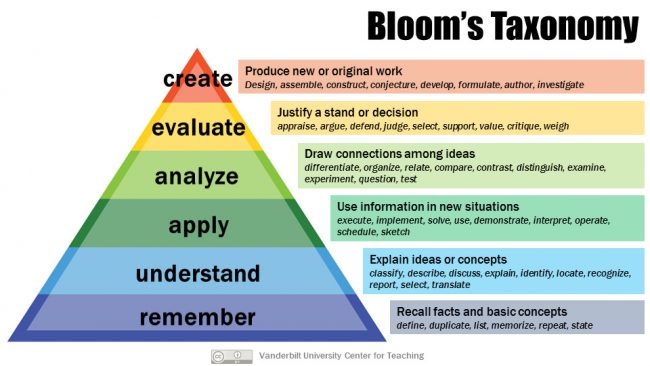In the 80s my parents bought a World Book Encyclopedia set from a door to door salesman.
I remember those books vividly. Every year, a yearbook would arrive that had updates on discoveries and changes that had happened in the world that year. The best part was that I got to go through the set and put the sticker that came with the yearbook on the articles in the other volumes. A simple task, yet something I looked forward to for many years. It taught me how to search, how to locate words alphabetically, how to appreciate that the world was changing and that there was always new information. I was introduced to topics I might not have otherwise read about.
Did I learn and memorize some mundane facts? Yes.
But I also learned so much more. I am not going to give all the credit to a set of encyclopedias. That goes to my dad. His love of information and passion to question and find answers was shared early on with me. The encyclopedias were there to give me answers but my teacher, my dad, was there to instill the skills I needed to become a learner.
I felt this story from my past fits in well with the topic of our class discussion. What should we be teaching in school? Are facts enough? Do students need to memorize when they can easily look something up on google? Those are age old questions in education. Will we ever be able to agree on an answer, probably not. Every generation believes that schools should be teaching the “basics”. It’s just that with a changing world, those basics need to adapt. Is it enough to just teach students how to add, subtract, multiply, and divide? To be able to just decode words and only understand the mechanics of writing? Maybe there was a time when those skills alone were enough for students to be successful in society. In 2020, we need more.
I believe this topic comes down to Bloom’s Taxonomy. What is our goal in education? Should we be teaching concepts for students to only remember? For some things, yes. But, we cannot stay there. Teachers need to be providing students with learning opportunities that challenge them to use all the levels of Bloom’s Taxonomy. Is that possible for every thing we do in all grades, no. In fact, the higher levels of the pyramid require a certain level of maturity. That doesn’t mean that we don’t try. Students need to be challenged to apply, analyze, evaluate, and create.
In both the videos Curtis and Lisa and Daina and Jocelyn shared they spoke to the importance of how teachers are teaching. Curtis and Lisa identified that the 4Cs – creation, consumption, curation, and connection should be be the focus of learning and that can be achieved with technology through the use of the Loti framework. The use of this framework has teachers examine the balance between between instruction, assessment, and the use of technology to promote higher level thinking. It also promotes engaged student learning and authentic assessment practices in the classroom. While the framework is slightly different from Bloom’s Taxonomy, the message is still the same. Teachers need provide students with opportunities to develop higher level thinking.
Daina and Jocelyn stated that teachers need to move away from basic questions that don’t involve thinking. A great example of this is when a student is assigned a novel to read and then has questions to answer such as, where did the character go after he finished his supper? Not only does that not require any thinking, it can be answered without having read the book at all. Kailyn also spoke to this regarding the conflict some professors are facing as they worry their exams can allow for cheating. Her answer to this was perfect, then change your exam. I don’t feel that this situation is only present with remote teaching. Students have always been able to cheat. Teachers can change that with the types of questions they are asking.
In grade 7, students are always so excited to see that the math textbook for the first time has an answer key at the back. It was one of the first things I would show them. They were so sure that math was going to be easy for the year because they had all the answers. I would explain that having the answer was not what I would be looking for but rather their ability to explain, show, apply what they had learned about the math concepts.
Just having a final answer does not mean you have learned something. Google, answer keys, encyclopedias can’t do the thinking for us. Those tools are important (maybe not the 80s version of the World Book Encyclopedia) but they are tools. As Daina and Jocelyn stated, it is a tool not a teacher.


I loved your introduction about the encyclopedias! We had a set at home growing up too. I would spend hours reading through them on my own. I had totally forgot about this until seeing it in your post. It took me a moment but I remembered ours were the “Funk and Wagnalls New Encyclopedia.” So then guess what I did? I Googled it to make sure that’s what they were called! Google brought up pictures of the same set that we had and it made me nostalgic! I also liked a statement that you made at the end of your post, “Just having a final answer does not mean you have learned something. Google, answer keys, encyclopedias can’t do the thinking for us.”
LikeLike
Thanks Jill! The irony of having to go to google to find the picture did not escape me either!
LikeLike
Your intro hooked me immediately! My family had a set of Encyclopedias too that we got from my Grandfather. It was so interesting to see the “information” that was shared and how, like everything, it can shift with the sands of time. I also thought the point about your dad really showed the need for a passionate teachers in our lives. When someone shows passion, curiosity and desire to learn I feel like they have this secret that we want to know more about. Their passion lights something up in us. What is really cool is how those foundational experiences with your dad and your encyclopedia’s translates to you being that leader and teacher for your students. The way you articulate yourself in this post, your use of research, critical analysis and awareness of the diversity of needs of learners exhibit how that foundation has grown and created space for others curiosities to be piqued in your presence. Very full circle post. Loved reading it.
LikeLike
Thanks so much Jacquie. I also enjoyed writing it as I discovered how my early experiences shaped who I am and my beliefs. I am happy that you were able to recognize that in my post!
LikeLiked by 1 person
Laurie!
I enjoyed your story about getting encyclopedias as a child. I also remember having these and my dad teaching me to use them. Doing research in elementary school, I valued the encyclopedia. I wrote in my blog about my dad being my ‘Google’ when I was young. He was the one I went to with all my questions and I believed he held all the knowledge in the world. It sounds like we had similar experiences with our dads creating a love for learning in us. Google cannot replace educators or any tool that can be used to learn. It is just another great tool we can use but need a variety of resources to be successful. Thanks for the post!
LikeLike
Love that you had the same experience with your dad! They hold such a special place in our lives.
LikeLiked by 1 person
The intro of your blog post regarding the encyclopedias was a great way to connect a tool of learning from the past to the current tool for learning, Google. But at the end of the day, these are only tools that can help students learn, but are not responsible to doing the teaching itself. I believe it is just a testimony that times are changing, and as a result the methods for obtaining knowledge must also change to keep up. I would argue that when the encyclopedia was first developed, people where having similar debates involving if teachers should be teaching the content that could be looked up in the encyclopedia.
LikeLike
Great point Skyler. As new “tools” get introduced we always think the previous one served us better. I like your statement – the methods for obtaining knowledge must also change. While the tools or methods will change, our passion for questions and learning needs to remain.
LikeLike